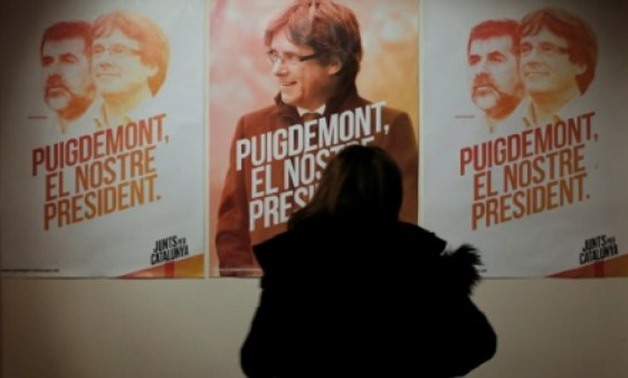
© AFP / by Patrick RAHIR | Carles Puigdemont, who is leading his party's campaign from Brussels, wants voters to return him as the "legitimate" president of Catalonia
MADRID- 4 December 2017: After their failed independence bid, which saw leaders being detained or fleeing abroad, Catalan separatists head into a new election this month divided over the future of their region but united against what they say is "repression" from Madrid.
The vote on December 21 comes amid Spain's worst political crisis in a generation after Catalan lawmakers declared independence following a banned referendum.
Madrid's response -- to sack Catalonia's parliament and government, suspend its autonomy and organise new elections -- has prompted a string of demonstrations in the region of 7.5 million people.
But Catalans remain deeply split on independence, and several polls suggest pro-secession parties might struggle to win enough seats to form a new regional government.
"From now until December 21, the dispute in the pro-independence camp is going to get worse and they will exchange blows," said Oriol Bartomeus, a political science professor at the Autonomous University of Barcelona.
"They could open up a rift that prevents them returning an overall majority."
In 2015 pro-independence parties won 47.8 percent of the vote, allowing them to ally with the far-left CUP to form the largest bloc in the region's parliament.
But the latest polls show support for secessionists hovering around 45 percent -- potentially putting another majority out of reach.
- Divisions -
Lawmakers in Catalonia -- a wealthy but indebted region which generates a fifth of Spain's GDP -- sent shock waves through Europe on October 27 by voting to split from Spain.
Their decision followed a banned referendum on the subject which separatists say provided a mandate for independence but which Spanish courts ruled to be illegal.
The conservative government of Spanish Prime Minister Mariano Rajoy invoked an unprecedented constitutional power to suspend Catalan autonomy and dismiss its leaders.
Several former lawmakers have been detained on charges of sedition, rebellion and misuse of public funds over their role in preparing the secession bid over the last two years.
And Catalonia's ousted president, Carles Puigdemont, is in self-imposed exile in Belgium, fighting an extradition request from Spain.
His former deputy Oriol Junqueras, one of those detained following the independence declaration, and who could be released on bail as early as Monday, hopes to see his ERC party, which is leading polls, to victory on December 21.
Its candidates are running on separate lists to Puigdemont's as the two parties compete for hegemony of the separatist bloc.
The ERC says it will not set a fixed date for independence, citing the popular divide on the matter, while the CUP has been criticising Puigdemont for not doing enough to push ahead with secession.
- Too close to call -
Puigdemont, who is running as a candidate despite his absence, launched his campaign last month from Brussels with a flurry of high-profile media appearances and a demand that he be returned as the "legitimate" president of Catalonia.
"Since then we've seen around 200,000 would-be voters switch from ERC to Puigdemont," Bartomeus said.
Rajoy and fellow opponents of Catalan independence have hitched their hopes on a record turnout on December 21 to return a legislature in favour of unity with Spain.
But opponents of independence are themselves divided, with Rajoy's Popular Party and its liberal ally Ciudadanos -- as well as the main opposition socialists -- failing to form a unified candidate list.
"I don't see a repetition of the alliance of three independence parties," said Jose Pablo Ferrandiz of the polling firm Metroscopia. "But neither do I see a government formed from three anti-independence parties."
With the result too close to call, the role of kingmaker could fall to Ada Colau, the popular mayor of Barcelona and head of the Catalonia in Common party, which opposes independence but would like to see a properly organised referendum for voters to decide.


Comments
Leave a Comment